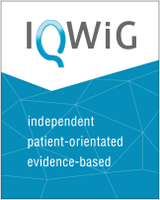Stereotactic radiosurgery for the treatment of vestibular schwannoma requiring intervention1
Authors
Institute for Quality and Efficiency in Health Care (IQWiG).Key statement
Research question:
The objective of this investigation is to assess the benefit of treatment with single-session stereotactic radiosurgery (SRS) using linear accelerators or cobalt-60 gamma sources in comparison with microsurgical resection in patients with vestibular schwannoma requiring intervention (primary, recurrence, or residual tissue) with regard to patient-relevant outcomes.
Conclusion:
Results on patient-relevant outcomes which were usable for the report were found in a total of 3 non-randomized prospective comparative studies with a follow-up duration of about 2 years. For each of the outcomes of facial paresis and hearing ability, there is a hint of greater benefit of SRS in comparison with microsurgical resection.
No data were available for the outcome of serious adverse events. With regard to the remaining outcomes, there is no hint of any greater benefit or harm of SRS in comparison with microsurgical resection. These outcomes include mortality, dizziness, headache, tinnitus, balance impairment, unfitness to work, adverse events as in complications of therapy and reinterventions as well as health-related quality of life.
Based on the benefit-harm assessment across outcomes, this results in a hint of greater benefit of SRS in comparison with microsurgical resection in patients with vestibular schwannoma requiring intervention.
Keywords:
Radiosurgery, Vestibular Schwannoma, Neuroma – Acoustic, Benefit Assessment, Systematic ReviewPublishing details
Publisher
Institute for Quality and Efficiency in Health Care
Topic
Stereotactic radiosurgery for the treatment of vestibular schwannoma requiring intervention
Commissioning agency
Federal Joint Committee
Commission awarded on
5 November 2020
Internal Commission No.
N20-03
Address of publisher
This report was prepared in collaboration with external experts.
The responsibility for the contents of the report lies solely with IQWiG.
According to §139b (3) No. 2 of Social Code Book (SGB) V, Statutory Health Insurance, external experts who are involved in the Institute’s research commissions must disclose “all connections to interest groups and contract organizations, particularly in the pharmaceutical and medical devices industries, including details on the type and amount of any remuneration received”. The Institute received the completed Form for disclosure of potential conflicts of interest from each external expert. The information provided was reviewed by a Committee of the Institute specifically established to assess conflicts of interests. The information on conflicts of interest provided by the external experts and external reviewers is presented in Chapter A8 of the full report. No conflicts of interest were detected that could endanger professional independence with regard to the work on the present commission.
External experts
- Jan Boström, Gamma Knife Centre at the Knappschaft Hospital (University Hospital) Bochum, Germany as well as Clinic for Radiation Therapy and Radio-Oncology at the Marien Hospital (University Hospital), Herne, Germany
- Roland Goldbrunner, University Hospital Cologne, Cologne, Germany
IQWiG thanks the external experts for their collaboration in the project.
IQWiG employees
- Thomas Jakubeit
- Wolfram Groß
- Martina Markes
- Christoph Mosch
- Mattea Patt
- Dorothea Sow
- Sibylle Sturtz
- 1
Translation of Chapters 1 to 6 of the final report N20-03 Stereotaktische Radiochirurgie zur Behandlung von interventionsbedürftigen Vestibularisschwannomen (Version 1.0; Status: 20 September 2021 [German original], 19 January 2022 [English translation]). Please note: This document was translated by an external translator and is provided as a service by IQWiG to English-language readers. However, solely the German original text is absolutely authoritative and legally binding.
